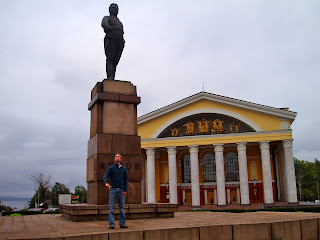“How can you possibly do a written geography exam?” our teacher exclaimed, flabbergasted at the concept of written exams for subjects such as geography, history, philosophy and literature. We, it must be said, were equally surprised to learn that Russians take oral exams not only in all these subjects, but also in subjects like Maths, Physics and Chemistry. The system seems to work something like this, at least for arts subjects. About a month before the exam, students receive a list of questions or topics to prepare. On the day of the exam they select a card at random, desperately hoping for a ‘good one.’ On this card will be a couple of the topics/questions. They then have 40 minutes or so to prepare and then they must go in and speak to their professor about the subject for 15 minutes or so. The Professor gives them a grade immediately, and they are done! It certainly saves on marking!
Grading is
different here as well: students are scored from 1 (unacceptable) to 5
(excellent). Tamara, my wonderful grandmotherly host likes to say “molodets, pyat” (excellent, 5) when I
successfully conjugate a difficult word! I won’t really be being graded at all
though – we don’t have any exams, so we will avoid what must be a nerve
shredding experience!
Another
difference which surprised me is that here, Fizcultura
(Sport) is not only a compulsory part of the timetable, it too is examined!
Can you imagine failing your degree in Art History because you couldn’t get
above 9 on the bleep test?! That might explain why I haven’t seen an overweight
student.
The university
day also operates differently here. It is divided into two halves, and you
either get lucky and have all your classes between 1:30 and 7pm, or you get
unlucky, and have to be at uni for an 8am lecture every day including, and this
is really bad… Saturday! In Russian schools and universities Saturday is just
another day, albeit one which is often shortened. The timetable only changes
every semester, so if you get the morning shift you miss out on lie-ins for a
full 4 months. Happily, my course doesn’t correspond to the Russian timetable -
I have all my classes between 11:30 and 3, Monday to Friday. I feel like a
right slacker!
Russian
universities also clearly value their contact hours. Even Literature students
have a full timetable (unlike the couple of hours a week they tend to get at
British universities). A university day consists of 3 or 4 para (pairs), each of which lasts one and a half hours, but with a
five minute break after 45 minutes, and 10 minute breaks between classes. It
seems to work quite well – enough time to cover a subject properly, but with a
well placed break to help you concentrate.
Most
aspects of the Russian education system are left over from the Soviet Union, in which education was one of the few areas
where they really excelled. Of all the countries I’ve visited, I’m fairly
convinced that Russians are the best educated of them all. Indeed, for decades
over 50% of the population have been getting university degrees, and pretty
much everyone seems to be able to recite Pushkin, has an opinion on Dostoevsky
and appreciate things like ballet and opera. This ought to be a recipe for
fantastic scientific innovation, artistic creativity, social progress and
economic growth, but alas, like so many things in Russia, things don’t work as they
ought to. But more on that another time.
PS - Just a caveat in case I've misrepresented anything - Our teacher explained most of this to us today in Russian - I may not have understood everything correctly, and I might have filled in a few gaps myself! So don't quote me on anything! And Russians out there - correct me where I've gone wrong please. Thanks.

























